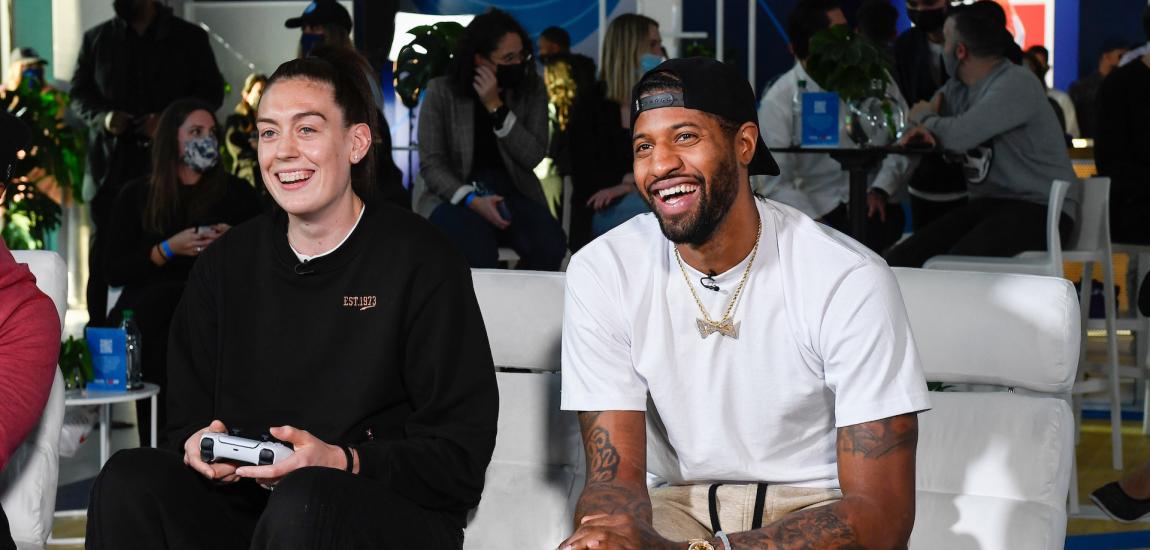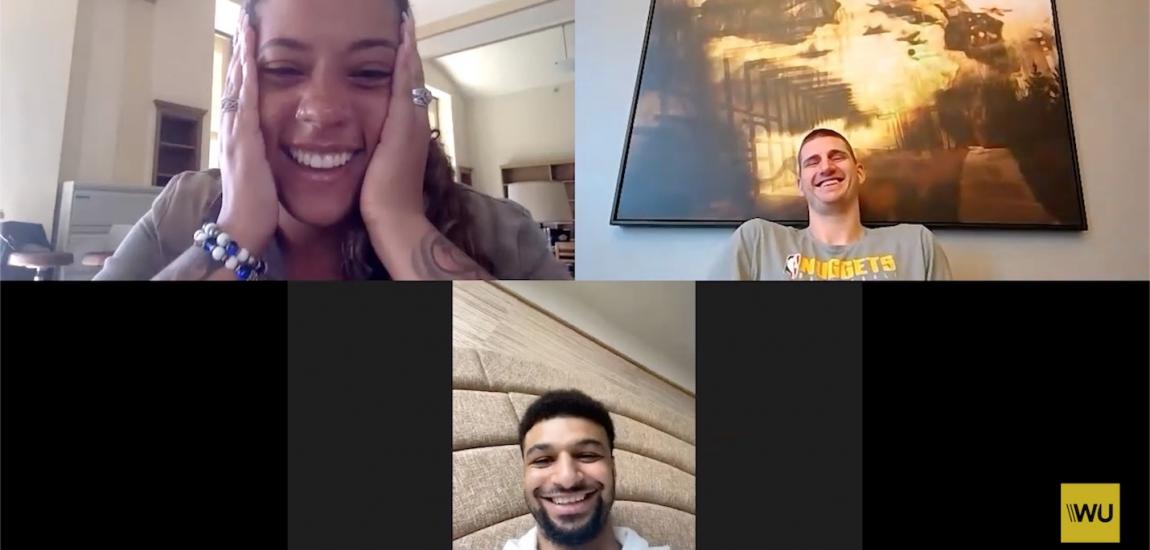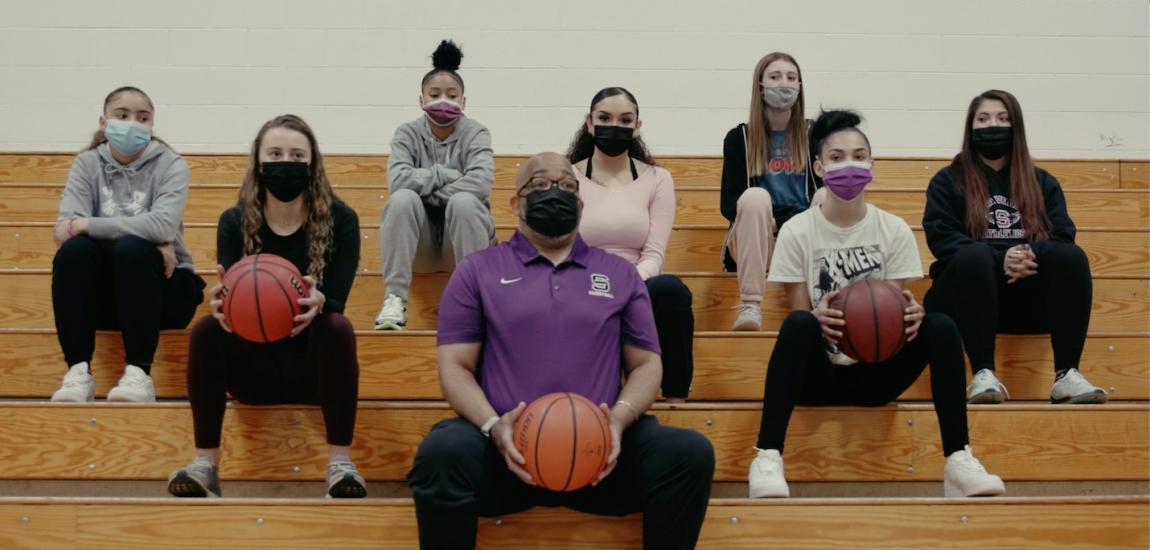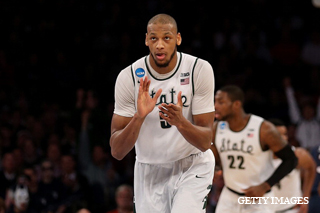
Adreian Payne takes a seat at his table Wednesday for the NBA Draft media event at the Westin New York Times Square. Payne is 23 years and 126 days old. At the modern NBA draft, this is ancient. On this day, reporters flock to the rich freshmen talent of the draft. Andrew Wiggins, Jabari Parker and Julius Randle have microphones up to their eyebrows. Payne does not.
About six reporters spread around the former Michigan State forward/center. One asks if it hurts Payne's draft stock that he is a senior.
"No, I don’t think it hurt me, I think it benefited me," Payne says. "If I would have gone out my freshman year, well, I wasn't ready."
Payne is a talented big man with the size and stamina to give him the potential of being an NBA starter. He has the wingspan to be a lockdown defender, while his game includes the finesse to perform in the post. At 6-10, 245 pounds, Payne's body is a prime ingredient.
Yet, Payne is just one of three seniors of the 20 players invited to this media function. The other two are Doug McDermott, the Naismith Player of the Year, and Shabazz Napier, the Final Four Most Outstanding Player.
Although NBA scouts never gushed over Payne, he had first round potential before this season. Payne, an interdisciplinary studies major, says he seriously considered leaving after his junior season, but non-basketball factors persuaded him otherwise.
"I made a promise to my grandma that I was going to graduate," he says of Mary Lewis, who raised him.
Napier is 22 years and 346 days old. McDermott is a modest 22 years and 173 days old. When Payne, Napier and McDermott started college, this year's freshmen class was still a year away from their SATs.
McDermott wears a checked-Polo button-down. He stands out from the flashy vests and bow ties in the room. McDermott looks more like a New York businessman than an NBA draft prospect primed to make seven figures to play basketball. The nation's 2013-14 leading scorer does not show any nerves dealing with media. He is treated more like a peer than a youthful subject.

"I feel like a vet with all these younger guys," he says. "I feel like it helps me a little too. I feel like I can step on the floor after four years of college. I've seen a little of everything. I've seen a lot of adversity, a lot of different defenses. It definitely plays into my favor."
When informed of McDermott's answer, Payne nods his head. The two are like father figures in the media room. Call them gurus if you will.
"I definitely feel like a vet. I feel like I have more experience. I'm more mature. I carry myself different than a lot of these guys," Payne says.
Coming from Michigan State, Payne has a deep pool of NBA talent in his contacts. He can pick the brain of a variety of Tom Izzo alumni. Payne mentions Draymond Green and Jason Richardson as two of his most notable allies. The former spent four years in East Lansing and is having a darn good NBA career. Most recently, Green averaged 11.9 points in seven NBA playoff games this season, starting four of them.
"[Draymond] said I made the right decision," Payne says. "He stayed four years, but it took him four years to get there. It wasn't just basketball for me. It was also academics. I wanted to graduate and make sure everything was on the right path. I knew I had to grow as a person off the court. It was just a matter of me trying to leave at the right time and have the right situation. It took four years and everything fell into place."
In Omaha, McDermott had his father as a coach, but he says he tried not to let that factor into his NBA plans. McDermott considered leaving after his junior season, but he got some good advice from a friend an NBA pro. Unlike Payne, McDermott's advice came from a high school teammate: Harrison Barnes, who happens to be Green's NBA teammate.
"He was big for me on the decision to come back to school," McDermott says of Barnes, whom he won back-to-back Iowa state titles with. "He was telling me you got to be 100 percent sure you want to do this. I really took that to heart. It's more of a job he said. They demand a lot more defensively than you think."
Marcus Smart cannot relate to Payne, McDermott and Napier academically. He does not have a college degree and he just turned 20 years old in March.
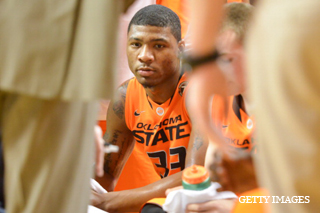
However, Smart also had to make decisions about his jump to the pros. After averaging 15.4 points in his freshmen season at Oklahoma State in 2012-13, Smart could have jumped to the NBA. He was a projected lottery pick, and at 6-4, 220 pounds, scouts salivated over Smart's bulky stature.
"Everybody looks at me and says I should be playing football instead of basketball," he laughs.
Smart made the controversial decision to stay in school for another season and develop his game. The decision received mixed reviews.
"I am aware of how much money I am giving up. I am aware of that," Smart said in April 2013.
There is no doubt Smart's draft place will be lower in 2014 than it would have been in 2013. Based on the poor performance of this past season's class of NBA rookies, the reasoning for Smart's 2013 potential draft placement is obvious. He would have been one of the most talented players in the draft. Now, he blends in with what is considered one of the best draft classes of all-time, due in part to the hefty dose of freshmen talent.
Smart ignores comparisons of last year's draft and this year's draft involving draft placement and salary. He is confident with his decision because he thinks he is better at basketball than he was a year ago. He thinks he is better because he stayed in school. He learned the essentials of a position and he learned about himself.
"It was an amazing year for me. I was able to go through some things that helped prepare me for the NBA, but not only the NBA, for life situations," Smart says. "I was able to embrace the point guard role. My coach, Travis Ford, he was a point guard. Being able to stay that extra year and learn and listen to the things he had to teach me was phenomenal for my game."
Almost any criticism about Smart involves his character. In February, the guard had an altercation with a fan in a game at Texas Tech, resulting in a three-game suspension for Smart. The incident was the lowest point in Smart's career and it left questions about his draft stock.
For Smart, although he is embarrassed by the suspension, the moment was a justification of his second season at the NCAA level. Both on and off the court, Smart had reason to learn. His brief time out of action allowed him to take a breath and find his place.
"I came back with a lot more focus," he says. "I was able to sit down and watch some film. I was able to sit back and relax and see what the coaches have been seeing, which sometimes as a player, you don't really comprehend because you're so focused on the game. It gave me enough time to get my thoughts together and just go back and play ball."
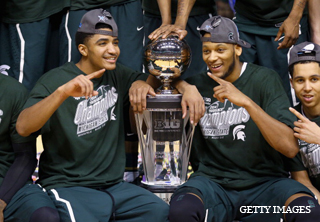
Smart finished his career with a 23-point, 13-rebound, five-assist, five-steal performance in an 85-77 loss to Gonzaga in the second round of the NCAA tournament. Smart became the first player in NCAA tournament history to put up totals of 20 points, 10 rebounds, five assists and five steals in one game. Despite the loss, the stat line gave his move validity.
Meanwhile, north of Stillwater, Gary Harris faced an almost identical situation to Smart in East Lansing. After averaging 12.9 points as a freshman in 2012-13, Harris could have bounced from Michigan State to the pros. After earning Big Ten Freshman of the Year honors and a Big Ten Tournament title, Harris was a potential lottery pick.
Harris opted to play under coach Tom Izzo one more season. In 2013-14 he averaged 16.7 points en route to a spot on the All-Big Ten First Team. Like Payne, his return to college for another season was related to conversations with Michigan State alums.
"I talk to Draymond a lot. Not only Draymond. I talk to guys like Mateen Cleaves, Mo[rris] Pete[rson], Charlie Bell, Alan Anderson. Those guys have been great. They're defeinitely resources for me looking out for my family."
After this season, Harris again evaluated his draft stock and personal readiness. He admits he leaned toward leaving for the NBA as the season progressed, but he made sure to talk things over with Izzo. The coach made things easy for him.
"He was like man, I'd be wrong to tell you to stay," Harris, who turns 20 in September, recalls. "I already got you to stay one more year. I can't have you stay three. He was definitely really encouraging me to leave. He said he'd support me either way. He'd love to have me back, but he said he believed I should take the next step."
Payne is not bitter toward those who leave school early. He is sure to made it clear he waited four years because it was what was necessary for him. If players have the skillset and mindset to jump early, so be it. He is confident Harris is ready to go after his sophomore season.
"He came from a good family, good support and he's young," Payne says, making his fatherly presence heard. "He still has that family support that is going to help guide him in the right way. He's a good kid that knows right from wrong. As long as he keeps his family first and is surrounded by good guys, he'll be fine."
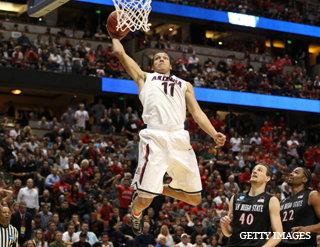
Michigan State may be the anti-one-and-done school, which means Payne's direct knowledge of it is limited. But he can speculate and he advises potential one-and-done prospects to proceed with caution.
"Kids that have done the one-and-done, I don’t think it's the mindset they come in [with]," Payne says. "They happened to be talented enough they could go one year and be done. I think there's some good to that and some bad. It works in both ways."
Former Arizona forward Aaron Gordon is on his way out of college after one year. The 6-9, 225-pounder averaged 12.4 points and 8.0 rebounds in 2013-14. That all came after Gordon won the MVP Award in the 2013 McDonald's All-American Boys Game.
Gordon admits he thought about being one-and-done before even arriving in Tuscon. However, while it was a possible edition to his agenda, he does not think it affected his game in a Wildcats jersey.
"It was [on my mind] a little bit," he says. "To stay in the moment, you can't think about being a one-and-done. What I did was push that out. I said I'll play as hard as I can and however long it takes me to get to the NBA, that's how long it's going to take."
The wild card to the leaving early versus staying all four years argument is the influx of foreign players. Many NBA Draft prospects from Europe, Australia, Asia, Africa and South America do not make NCAA basketball part of their path. For these players, the comparisons are up for their disgression.
Croatian 20-year-old Dario Saric was set to be a high lottery pick in the draft. To the surprise of many, earlier this week, Saric signed a three-year contract with the Turkish club Anadolu Efes. The deal means Saric will not be in the NBA at least the next two seasons, and it means he probably will not be a lottery pick.
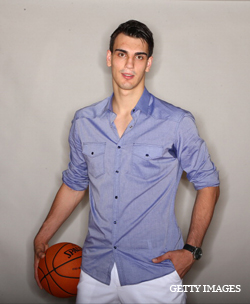
In a way, Saric decided, despite his raw talent, he was not ready for the American pro game. Instead, he will groom it for another couple of years in Europe.
"I think it's better for me to bring my basketball level up in Europe. So many European guys lose it in the NBA. I must be ready," he says.
Like his American NCAA counterparts, Saric, who compares his game to Toni Kukoc and Lamar Odom, reached out to NBA talent for help. He discussed the manner with Roko Ukic, the Croatian guard who played with Raptops and Bucks from 2008-2010. Ukic waited three years to come overseas after being drafted 41st overall in 2005.
Although Ukic initially advised Saric to come over right away, he supported Saric's reason.
"He said if it's one year or two years more, it won't be a problem for you," Saric says.
It feels like this year's freshmen class has been the story since the 2013 NBA draft ended. The high school class of Andrew Wiggins, Jabari Parker, Joel Embiid, Julius Randle, Gordon, Tyler Ennis, James Young, Noah Vonleh and more may be the most star-studded single year of all-time.
Despite popular belief, being one-and-done does not always provide players with the best future. It also does not mean only players with the most potential come out after one year.
For players like Payne and McDermott, and to a lesser degree Smart, Harris and Saric, there is a bit of a rivalry between them and the freshmen. If it is the chip the older prospects need on their shoulders, so be it.
-- Follow Jeffrey Eisenband on Twitter @JeffEisenband.

